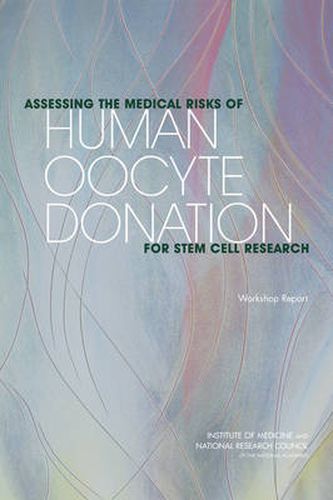Readings Newsletter
Become a Readings Member to make your shopping experience even easier.
Sign in or sign up for free!
You’re not far away from qualifying for FREE standard shipping within Australia
You’ve qualified for FREE standard shipping within Australia
The cart is loading…






It is widely understood that stem cell treatments have the potential to revolutionize medicine. Because of this potential, in 2004 California voters approved Proposition 71 to set up a 10-year, $3 billion program to fund research on stem cells. Under the direction of the California Institute for Regenerative Medicine, this program will pay to build facilities for stem cell research and will fund doctors and scientists to carry out research with the ultimate goal of helping to develop therapies based on stem cells. For this research to move forward, however, will require a steady supply of stem cells, particularly human embryonic stem cells. Those stem cells are collected from developing human embryos created from eggs-or oocytes-harvested from the ovaries of female donors. Thus much of the promise of stem cells depends on women choosing to donate oocytes to the research effort. The oocyte donation process is not without risk, however. Donors are given doses of hormones to trigger the production of more eggs than would normally be produced, and this hormone treatment can have various side effects. Once the eggs have matured in the ovary, they must be retrieved via a surgical procedure that is typically performed under anesthesia, and both the surgery and the anesthesia carry their own risks. Furthermore, given the very personal nature of egg donation, the experience may carry psychological risks for some women as well. With this in mind, in 2006 the California Institute for Regenerative Medicine contracted with the National Academies to organize a workshop that would bring together experts from various areas to speak about the potential risks of oocyte donation and to summarize what is known and what needs to be known about this topic. The Committee on Assessing the Medical Risks of Human Oocyte Donation for Stem Cell Research was formed to plan the workshop, which was held in San Francisco on September 28, 2006. This report is a summary and synthesis of that workshop.
$9.00 standard shipping within Australia
FREE standard shipping within Australia for orders over $100.00
Express & International shipping calculated at checkout
It is widely understood that stem cell treatments have the potential to revolutionize medicine. Because of this potential, in 2004 California voters approved Proposition 71 to set up a 10-year, $3 billion program to fund research on stem cells. Under the direction of the California Institute for Regenerative Medicine, this program will pay to build facilities for stem cell research and will fund doctors and scientists to carry out research with the ultimate goal of helping to develop therapies based on stem cells. For this research to move forward, however, will require a steady supply of stem cells, particularly human embryonic stem cells. Those stem cells are collected from developing human embryos created from eggs-or oocytes-harvested from the ovaries of female donors. Thus much of the promise of stem cells depends on women choosing to donate oocytes to the research effort. The oocyte donation process is not without risk, however. Donors are given doses of hormones to trigger the production of more eggs than would normally be produced, and this hormone treatment can have various side effects. Once the eggs have matured in the ovary, they must be retrieved via a surgical procedure that is typically performed under anesthesia, and both the surgery and the anesthesia carry their own risks. Furthermore, given the very personal nature of egg donation, the experience may carry psychological risks for some women as well. With this in mind, in 2006 the California Institute for Regenerative Medicine contracted with the National Academies to organize a workshop that would bring together experts from various areas to speak about the potential risks of oocyte donation and to summarize what is known and what needs to be known about this topic. The Committee on Assessing the Medical Risks of Human Oocyte Donation for Stem Cell Research was formed to plan the workshop, which was held in San Francisco on September 28, 2006. This report is a summary and synthesis of that workshop.